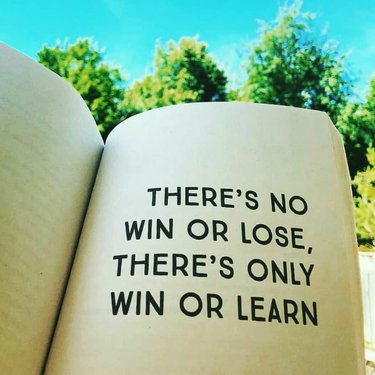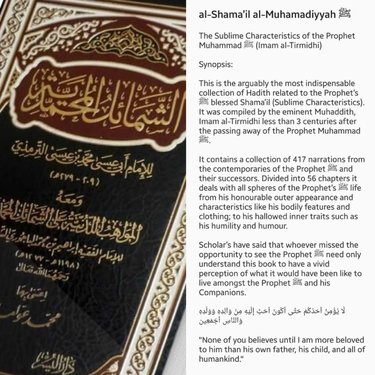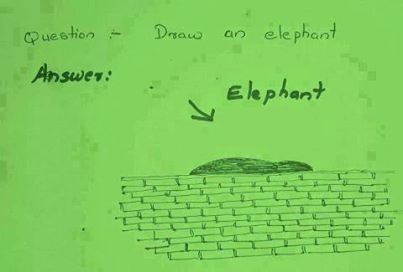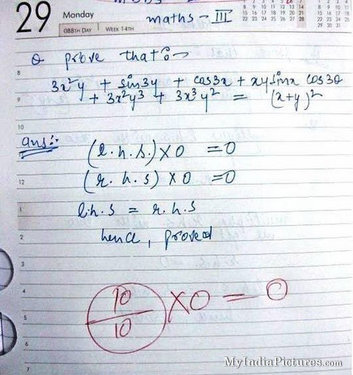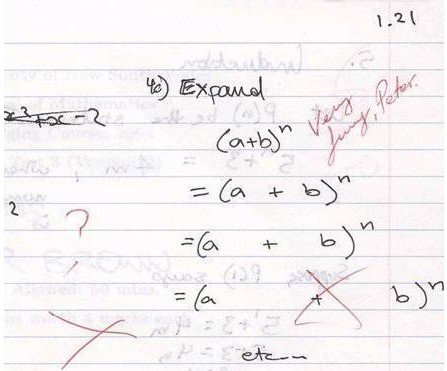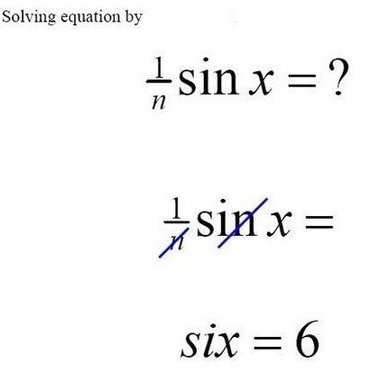-
Posts
1,751 -
Joined
-
Last visited
-
Days Won
106
Content Type
Profiles
Forums
Events
Everything posted by Bint e Aisha
-
- 36 replies
-
- inspiration
- motivation
-
(and 1 more)
Tagged with:
-
- 36 replies
-
- inspiration
- motivation
-
(and 1 more)
Tagged with:
-
- 36 replies
-
- inspiration
- motivation
-
(and 1 more)
Tagged with:
-
Imam Ibn ul-Qayyim (rahimahullah) said: “If your aim is piety, other aims are never missed.” [al-Fawaaid (English Translation), page 79]
-
There is a story related by Mufti Taqi Uthmani Sahib regarding his father, Mufti Shafi’ (رحمه الله) the author of Ma’ariful Qur’an. He says he noticed that his father always gave to beggars whatever he had so he mentioned that there was no need for that as many of them were not deserving of it and they were often professional beggars. Mufti Shafi’(رحمه الله) replied that he knew that however he felt that if he started giving to only those who were deserving, what would happen if Allah ta’ala also started doing that? He meant that Allah ta’ala gave so much despite us not deserving it. What would happen if He only gave to those who were deserving of it? Source
-
Abu Huraira reported: The Prophet, peace and blessings be upon him, said, “Generosity is near to Allah, near to Paradise, near to the people, and far from the Hellfire. Miserliness is far from Allah, far from Paradise, far from the people, and near to the Hellfire. An ignorant generous person is more beloved to Allah Almighty than a stingy scholar.” Source: Sunan al-Tirmidhī 1961 Grade: Sahih (authentic) according to Al-Suyuti عَنْ أَبِي هُرَيْرَةَ عَنْ النَّبِيِّ صَلَّى اللَّهُ عَلَيْهِ وَسَلَّمَ قَالَ السَّخِيُّ قَرِيبٌ مِنْ اللَّهِ قَرِيبٌ مِنْ الْجَنَّةِ قَرِيبٌ مِنْ النَّاسِ بَعِيدٌ مِنْ النَّارِ وَالْبَخِيلُ بَعِيدٌ مِنْ اللَّهِ بَعِيدٌ مِنْ الْجَنَّةِ بَعِيدٌ مِنْ النَّاسِ قَرِيبٌ مِنْ النَّارِ وَلَجَاهِلٌ سَخِيٌّ أَحَبُّ إِلَى اللَّهِ عَزَّ وَجَلَّ مِنْ عَالِمٍ بَخِيلٍ 1961 سنن الترمذي كتاب البر والصلة باب ما جاء في السخاء 4788 المحدث السيوطي خلاصة حكم المحدث صحيح في الجامع الصغير
-
اللَّطِيفُ Translation اللَّطِيفُ is translated as The Subtle, The Gracious and The Refined. It has a lot of meaning. Some names have overlapping meanings but have subtle differences. Definition That Being Who treats others well and with such compassion that a person does not even know / realise they are the recipient of such compassion. The One Who is giving that compassion takes care of the Asbaab to resolve issues from such places that the recipient does not realise. Allah ta’ala says in the Qur’an, اللَّهُ لَطِيفٌ بِعِبَادِهِ يَرْزُقُ مَنْ يَشَاءُ ۖ وَهُوَ الْقَوِيُّ الْعَزِيزُ Allah is very Kind [Gracious] to His servants. He gives sustenance to whom He pleases. He is the Powerful, the Almighty. [Surah Shura: 19] The word لَطِيف is used in two major ways in the Arabic language: • As above i.e. That Being Who treats others well and with such compassion that a person does not even know /realise they are the recipient of such compassion • That Being which is so subtle / refined that it cannot be perceived by the senses. A beautiful point is made in the commentary: Allah ta’ala is لَطِيف and His compassion is like water. It comes everywhere, fills all types of vessels, people use it in all different ways or waste it and it reaches all of creation. Allah ta’ala’s compassion is fluid and in all crevices and corners! The word encompasses all these meanings. Yet another meaning is that لَطِيف is something subtle, so اللَّطِيفُ is that Being Who knows about the smallest things (very similar to الْخَبِيرُ which is next). Another meaning is that Being Who wants good for all His servants and arranges the Asbaab for it i.e. He creates the means and ways for all things good in this world and the best of it is Imaan and Hidaayah. Yusuf AS said: إِنَّ رَبِّي لَطِيفٌ لِمَا يَشَاءُ ۚ إِنَّهُ هُوَ الْعَلِيمُ الْحَكِيمُ Indeed, my Lord is Subtle in what He wills. Surely He is the One Who is the Knowledgeable, the Wise.[Surah Yusuf: 100] This was said when he was speaking to the prisoners in jail, describing Allah ta’ala as لَطِيف. The commentary spends a lot of time on discussing Surah Yusuf as all the episodes within it are a reflection of this name. Allah ta’ala plans and determines as He wishes and it is beyond our perception and understanding. In the episodes in Surah Yusuf, something would happen and that would become the means to something else. Something bad like Yusuf AS’s brothers throwing him in the well led to something good. Allah ta’ala being اللَّطِيفُ saved him and sent him to the house of the ‘Azeez of Misr. The brothers intended something and Allah ta’ala used their plotting and transferred it to something positive. Another example is that of Zulaykha when she wanted Yusuf AS humiliated by sending him to jail however Allah ta’ala being اللَّطِيفُ took him out and made him a minister in Misr. The brothers of Yusuf AS wanted to separate father and son as their father loved Yusuf AS the most but Allah ta’ala being اللَّطِيفُ gathered them all together in the end. Therefore this one of those names of Allah ta’ala which seems mysterious and hard to explain. It has these subtle elements which works in subtle and mysterious ways and not straightforward like الْخَالِقُ. On a basic level all the names i.e. knowing, having power over everything etc. mean the same thing but they have different tones and colours, so for a blue there are different shades of blue. Similarly, though the names sound similar to each other they have different shades. In the Qur’an It is mentioned 7 times in the Qur’an in the context that nothing is hidden from Allah ta’ala. In the following verse of Surah Mulk, Allah ta’ala mentions Himself i.e. The One Who created everything, does He not know? أَلَا يَعْلَمُ مَنْ خَلَقَ وَهُوَ اللَّطِيفُ الْخَبِيرُ Would He not know, Who has created them? He is the Knower of finest mysteries, and aware of everything. [Surah Mulk: 14] He knows even the minutest detail. He knows the subtle matters and the greater matters, the universe, human beings and every act we do, good or bad which will be compensated in the Aakhirah. When a person realises this in the heart, then they will be careful about their actions. Another place it is mentioned is in Surah An’aam, verse 103: لَا تُدْرِكُهُ الْأَبْصَارُ وَهُوَ يُدْرِكُ الْأَبْصَارَ ۖ وَهُوَ اللَّطِيفُ الْخَبِيرُ No vision can grasp Him while He grasps all visions. He is the Subtle, the Aware. Allah ta’ala is so subtle that a person cannot perceive Him yet He can perceive everything. “You will find God in the detail” Another way this name is used is that He is beyond perception and understanding. He works in a mysterious and subtle manner. There is a saying of a scientist, “You will find God in the detail” i.e. you will wonder when looking into the details under microscopes and in the laws of gravity and the laws of nature. Looking at these things a person will find Allah ta’ala. Counsel Allah ta’ala is compassionate to people and makes it easy by granting means so we should also adopt this and make ways and become the means to make it easy for people and this is part of compassion. There is a saying in English, “Give a man a fish and he will eat for a day. Teach him how to fish and he will eat for a lifetime.” Part of being لَطِيف is giving people the means and ways to earn a living i.e. offer a job or help look for work. Therefore compassion by giving others the means to do good, to find Khayr and be better. *~~*~~*
-
الْعَدْلُ Translation الْعَدْلُ is translated as The Just and The Equitable. Definition The One Who is Just and from Whom just actions emanate. He is the epitome of justice and equity. The true meaning of عَدْل is to be equal, to be proportioned. It connects with الْحَكَمُ as a judge is supposed to be just. Both words are used in Surah Nisaa’ (part of verse 58), أَنْ تَحْكُمُوا بِالْعَدْلِ - judge with fairness – i.e. you should judge with fairness in terms of people The word اعتدال (I’tidaal) comes from this name. It means not to be excessive in any way, to be equal. عَدْل is not just equality in the external form but it includes the internal as well i.e. when a person says something or presents one’s self a certain way, then the way he is on the surface, is the way he should be internally, in the heart. It is to have equality/balance in the Dhaahir (External) and the Baatin (Internal) forms. There is no excess when dealing with anyone i.e. excessively nice or mean. The balance should be such that the deepest of love and the most extreme enmity cannot tip the scale. Unfortunately most of us do not have this عَدْل and even with our own children we are not equal. We are unfair and show favouritism and the balance tips over due to an emotional attachment. The Prophet sallallaahu ‘alayhi wasallam told parents to fear Allah ta’ala and to be fair with all their children. When we are affectionate with one child the others feel it. It is part of Taqwa to be Just Being just is a means to attain Taqwa. It is a spiritual condition of the heart and part of it is to have عَدْل which is to treat friend and foe with justice, and not to look at who did favours for us. We are often more loyal to people than to truth and justice. To have this trait of being just is an effective way of attaining Taqwa. In Surah Maidah (verse 8) Allah ta’ala says, اِعْدِلُوا هُوَ أَقْرَبُ لِلتَّقْوَىٰ - Be fair, it is closer to God consciousness We think Taqwa is to pray a lot and how we dress etc. but being just is also Taqwa. It is how we live and how we treat people even if it’s someone we do not like. If you want to know the true personality of a person, then do not look at how they treat their elders or people in power. Look at how they treat those below them i.e. the janitor at the workplace or helpers in the office, maids etc. A Muttaqee is a person who practices such عَدْل that no friendship or enmity can change it and it is fear of Allah ta’ala which leads to this. The more fear of Allah ta’ala, the less fear of people. Sometimes you have to choose the truth over a person you are loyal to and in doing so, you may lose the person but you still choose the truth. That is Taqwa. ‘Umar RA was known for عَدْل. He did not care if people liked him or not. He had great fear of Allah ta’ala and that is why people feared him, yet his fear of Allah ta’ala made him cry. Two things are necessary to be a person of justice: • One has to be dominating - a decree is made and implemented which no one can go against. • One has to be Hakeem – to be able to judge with Hikmat and intelligence One of the ways Allah ta’ala can punish a person is in a hidden way where the person does not realize he is being punished for some injustice he may have done. Their conscience will tell them that Allah ta’ala is showing His justice i.e. Poetic justice - they are getting what they deserve as they have been getting away with for too long. There is no true justice in this world. That will come in the Aakhirah, Allah ta’ala being الْعَدْلُ. Justice is Manifested through actions Imam Ghazali (rahimahullah) says one cannot know one who is just without knowing his justice and one cannot know his justice without knowing his actions. Therefore justice is manifested through actions. Balance in the Creation of Allah ta’ala To comprehend this Sifat we have to understand the actions of Allah ta’ala – To see the balance in the creation of Allah ta’ala from the heavens to the earth. Allah ta’ala tells us in the Qur’an to see again and again and we will find no faults or rips or weakness because of the harmony and regularity of the whole universe. When you see this you see the justice of Allah ta’ala i.e. there is a balance, proportion in the whole universe, in the planets and how the earth is not too far or too close to the sun. Justice with Your own self (Nafs) This is another concept of justice. How? • A person should show justice between his Nafs and his Lord – to keep Allah ta’ala’s rights and His pleasure over one’s own desires. Allah ta’ala takes precedence over anything else, to follow His commands and refrain from prohibitions. • A person should stay away from all things which cause him physical and spiritual ruin. To be content and have Sabr and not to take responsibility which cannot be fulfilled. • A person should be just between his Nafs and the rest of creation – to be a well-wisher for all creation and not to do any type of Khiyaanah in major or minor matters and to demand justice for one’s own self and for others i.e. as a mother to be fair to all children, male or female, as a teacher to be fair to all students etc. All this will balance the Nafs. Injustice cause Allah ta’ala’s Punishment to come When a person is unjust, it affects all aspects of his life i.e. if he is a businessman, the business will be conducted in the wrong way for more money and sooner or later the injustice will affect his business as when a person does major injustice, Allah ta’ala will punish. It is mentioned in Hadith that when injustice becomes common the earthquakes, typhoons, epidemics etc. will increase. This is a physical result of Dhulm (Injustice). When injustice occurs and other people do not stop it they are also regarded as unjust (Dhaalim). It is mentioned in Hadith regarding a town that Allah ta’ala commanded Jibra’eel AS to destroy this town. He asked Allah ta’ala regarding a person in that town who worshiped Allah ta’ala constantly and Allah ta’ala told him to annihilate that pious man first, since he did not bother to guide his people. Therefore we should not be complacent to injustice as we would also be regarded as unjust. The concept of being unjust is the opposite of عَدْل – the definition of being unjust is putting something where it does not belong and Dhulm is unrightfully possessing something; acting like you own something you don’t. In the Qur’an It is mentioned 22 times in the Qur’an. إِنَّ اللَّهَ يَأْمُرُ بِالْعَدْلِ وَالْإِحْسَانِ - Allah commands doing justice, doing good to others [Surah Nahl: 80] اِعْدِلُوا هُوَ أَقْرَبُ لِلتَّقْوَىٰ - Be fair, it is closer to God consciousness [Surah Maidah: 8] وَإِذَا حَكَمْتُمْ بَيْنَ النَّاسِ أَنْ تَحْكُمُوا بِالْعَدْلِ - Allah commands you to give back the trusts to their rightful owners, and when you judge between people, judge with fairness. [Surah Nisaa’: 58] In a Hadith it is mentioned that the first people to be under the shade on the Day of Judgement will be those who, when truth came before them they accepted immediately and when asked, they would spend their wealth and when they were asked to make a decision, they would decide with justice. Therefore this is an important trait; to have such sincerity that you decide for someone as though you were deciding for yourself on a major issue. When seeking advice from someone, it should be a person with certain traits and one of them is this one. Counsel We have to practice justice and I’tidaal in all matters whether they are personal matters and interactions with people or business matters. Justice is not just in disputes but all matters i.e. to be just when we are eating, sleeping, talking, in our ‘Ibaadah, in our beliefs and actions, in our emotions, our relations and also with ourselves. We should not use our body in any un-Islamic activity. We should be balanced in times of difficulties by not saying words of ingratitude, not despairing or getting angry. We should be balanced in good times by not having Takabbur or be miserly. Therefore emotional balance, health, family balance and spiritual balance, this is all part of عَدْل and this is the counsel for us. *~~*~~*
-
الْحَكَمُ Translation الْحَكَمُ is translated as The Judge and The Arbitrator. Definition It is One Who Decides and Whose decisions cannot be rejected. وَلَا يُشْرِكُ فِي حُكْمِهِ أَحَدًا - and He does not let anyone share in His command. [Surah Kahf; 26] All decisions come from Allah ta’ala - regarding the entire universe, eternity, our temporary lives, our Rizq, life, death, peace and love, difficulties we will go through, children etc. In the world Allah ta’ala decides between truth and falsehood and in the Aakhirah He decides whether people are fortunate or unfortunate. Allah ta’ala’s decision is ongoing in the world on whether a person believes or disbelieves and follows the truth or not. أَفَغَيْرَ اللَّهِ أَبْتَغِي حَكَمًا وَهُوَ الَّذِي أَنْزَلَ إِلَيْكُمُ الْكِتَابَ مُفَصَّلًا ۚ Say: Should I seek a judge other than Allah, when He is the One Who has revealed this Book (The Qur'an) with full details? [Surah An’aam: 114] In the Qur’an It is mentioned once in the Qur’an in terms of Allah ta’ala (the verse above). Accepting Allah ta’ala’s Decree For us when it comes to Allah ta’ala’s decree we should be content and this is the effect this name should have on us i.e. Allah ta’ala is The One Who decides, arbitrates and judges. The Prophet sallallaahu ‘alayhi wasallam said, “Wondrous is the affair of the believer for there is good for him in every matter and this is not the case with anyone except the believer. If he is happy, then he thanks Allah and thus there is good for him, and if he is harmed, then he shows patience and thus there is good for him.” [Muslim] Therefore for a Believer it is a win, win situation where there is no loss through doing Sabr and Shukr. A lot of psychological problems like anxiety, depression, etc. can be alleviated if we accept the decree of Allah ta’ala. These problems are to do with questioning and not accepting His decree. All decisions regarding anything that benefits or harms, lies with Allah ta’ala. In Surah Baqarah (part of verse 102) Allah ta’ala says, وَمَا هُمْ بِضَارِّينَ بِهِ مِنْ أَحَدٍ إِلَّا بِإِذْنِ اللَّهِ -although they could harm none with it except with Allah's permission. Another point is that if Allah ta’ala decides / wills a difficulty to happen due to our own sins as a punishment, or due to Allah ta’ala wanting to increase our ranks, we know that it is the decree of Allah ta’ala and when we know this, it becomes easy for us not to judge, get upset or have bad feelings towards others. We should then turn to Allah ta’ala and not to people i.e. in Du’a we should call out, “O Allah, You are Al-Hakam. You are The Decider so decide in my favour in this difficulty.” Sometimes we do not know what is best for us and only retrospectively realize that what happened was in our favour. We plan but Allah ta’ala is the best of planners. Therefore when things do not go the way we want especially when we have worked hard for something, then we should realize there must be Khayr in it and Allah ta’ala is The Decider. A Comprehensive Sifat Scholars say this is a very high level and comprehensive Sifat of Allah ta’ala with a lot of meaning in it. A Haakim can only be that Being Who has perfect sight, hearing and knowing. So Allah ta’ala being الْحَكَمُ incorporates other Sifaat of Allah ta’ala - السَّمِيعُ الْبَصِيرُ الْعَلِيمُ Counsel We should have Yaqeen (Certainty) that all decisions come from Allah ta’ala and this should result in Itminaan (contentment) , tranquility of the heart. Those who do not accept the decree of Allah ta’ala do not have Itminaan. The Prophet sallallaahu ‘alayhi wasallam said, “The strong believer is better and more beloved to Allaah than the weak believer, although both are good. Strive to do that which will benefit you and seek the help of Allaah, and do not feel helpless. If anything befalls you, do not say ‘If only I had done (such and such), the such and such would have happened,’ rather say: ‘Allaah has decreed and what He wills He does,’ for ‘if only’ opens the door to the work of the shaytaan.” [Muslim] Therefore do not go back and revise your history. It can cause anxiety and depression. Even psychologists who study human behaviour say those who take out “If” out of their thinking are happier, balanced people. We accept worldly leaders and their decisions even if it is a leader we do not like and have not voted for. We should accept the decisions of Allah ta’ala as it is He Who makes the laws of the universe. *~~*~~*
-
Holiday Period Moulana Yunus Patel (rahimahullah) mentioned: The holiday period – even week-ends – are a time of great test and trial. There is encouragement and enticement towards all kinds of haraam. Beach partying, intermingling and courting, immodest dress, loud music and dance, smoking, drinking and drug-taking become the programme and timetable for many Muslims. Salaah becomes a forgotten duty and the Islamic dress and identity are discarded. The Muslim youth are supposed to be tomorrow’s leaders for the Ummah. They are to be the representatives of Deen, inviting the non-Muslims to Islam, with the modesty and purity of thought, speech, dress and actions, which should be the characteristic of every Muslim. Deen and sharee‘ah do not stifle us, do not deprive us of pleasure and enjoyment, do not deny us happiness and celebration. Deen and sharee‘ah also accommodate leisure and pleasure. Islam is beautiful; most beautiful. Islam is not ‘dry’. It is enjoyable. Allah Ta‘ala has only placed certain boundaries through His Divine prohibitions, for our own benefit, safety and well-being. So let us make the effort and avoid sins. Let us not walk the route towards sins. Let us keep clear of the venues of sins like how we would if we had fore-knowledge that there will be an earthquake, tsunami or bomb-blast devastating such places. We fear for our lives. The greater need is to fear for our imaan. Let us not forget that we are Muslims. Let us not forget our relationship with Allah Ta‘ala. Let us not forget that death can visit unexpectedly. Let us not forget that there is accountability. Let us not forget Jannah. Let us not forget Jahannum. (Adapted from “Seeking the Shade of the ‘Arsh” pg. 92) http://ibnuabbaas.co.za/?p=954
-
YOUTH HUB Be Inspired: Be a Man! Bidding Farewell to his Bride Bodybuilding Look at the Finish line! Six Checkpoints It's Happening on New Years Eve Hanging around in the Wrong 'Joints' Interested in Girls Committed the Sin Again Watching and Following Soccer As You Live, so Shall You Die Masturbation - A Disastrous Problem Faced by the Youth The Perfume of Piety Muhammad bin Qasim : The Youth Commander of Islam Short Audios: Friends are Smoking Weed What's your Number??? Moment of Pleasure, Lifetime of Regret Youth Programmes: Islaahi Jalsa - Ml Ridwaan Kajee (D.B) Islaahi Jalsa - Mufti Yusuf Desai (D.B) For More Inspiring Advices, visit www.ibnuabbaas.co.za
-

Islamic blogs and links
Bint e Aisha replied to Umm Khadeejah's topic in General Islamic Discussions
Great site for the youth: http://ibnuabbaas.co.za/ -

Islamic blogs and links
Bint e Aisha replied to Umm Khadeejah's topic in General Islamic Discussions
http://spiritofsunnah.blogspot.com/?m=1 -

Shamaail Tirmidhi
Bint e Aisha replied to ummtaalib's topic in Muhammad (Sallallaahu 'alayhi wasallam)
-
الْبَصِيرُ It is interesting to see some names coming in pairs and some in strings, all having some association with each other or having similar meanings i.e. الْخَالِقُ، الْبَارِئُ، الْمُصَوِّرُ while السَّمِيعُ and الْبَصِيرُ have some association as they are to do with the senses. Translation الْبَصِيرُ is translated as The All-Seeing and The All-Perceiving. Definition The One Who sees all human matters and nothing is removed or distant from Him, not even under the earth. Ibnul Qayyim (Rahimahullah) gives an example of an ant hidden on a black stone on the darkest of nights which Allah ta’ala can see. Allah ta’ala can see even the most hidden matters which human beings with their science and microscopes cannot see. Allah ta’ala knows and can see all the actions and conditions of all the Makhlooq and not just human beings. In the Qur’an It is mentioned 42 times in the Qur’an in different ways. Allah ta’ala can see everything and it is not limited or exclusive. وَاتَّقُوا اللَّهَ وَاعْلَمُوا أَنَّ اللَّهَ بِمَا تَعْمَلُونَ بَصِيرٌ Fear Allah and beware that Allah observes your actions. [Surah Baqarah: last part 233] وَهُوَ مَعَكُمْ أَيْنَ مَا كُنْتُمْ ۚ وَاللَّهُ بِمَا تَعْمَلُونَ بَصِيرٌ and He is with you wherever you are. Allah is aware of all your actions. [Surah Hadeed: 4] Vision/Sight Allah ta’ala has given all of Makhlooq some type of vision and it is a very great Ni’mah. Allah ta’ala says in the Qur’an, أَلَمْ نَجْعَلْ لَهُ عَيْنَيْنِ - Have We not given him two eyes to observe? وَلِسَانًا وَشَفَتَيْنِ - One tongue and two lips to control it? [Surah Balad: 8-9] It is mentioned in a Hadith, “Allah said, ‘If I deprive my slave of his two beloved things (his eyes) and he remains patient, I will let him enter Paradise in compensation for them.’” [Bukhari] Of all the senses we are blessed with, sight is the most important, so important that Allah ta’ala made them so that they are protected by eyelids, eyelashes and eyebrows, all fitted in the face between hard bones to protect the soft, delicate eyes. With them Allah ta’ala gave us the means to see different colours and creation. Concept of Perception The concept of perception i.e. some types of dolphins and other animals which are almost blind rely on other senses such as hearing through sound which bounce off objects by which they perceive what the objects are. Blind people also have some type of ability to perceive through other senses and body parts. Two words come from Baseer • Baseerah – to see spiritually i.e. when a person has Taqwa and Qalbi Saleem they have the Noor of ‘Ilm in their hearts and they perceive things differently. • Basaarah – to see with the physical eyes Therefore the concept of perception is not just to do with seeing with the eyes but also through other senses and in other forms. Vision of Allah ta’ala One of the points which come up in the discussion of this name is that we can perceive so many things of the Dunya and we can look at the sky and see the stars which are so many light years away with our naked eyes without telescopes but we cannot see Allah ta’ala while He can see us. Musa AS asked to see Allah ta’ala and he fainted when Allah ta’ala made apparent to him just a glimpse of something from behind many curtains, وَلَمَّا جَاءَ مُوسَىٰ لِمِيقَاتِنَا وَكَلَّمَهُ رَبُّهُ قَالَ رَبِّ أَرِنِي أَنْظُرْ إِلَيْكَ ۚ قَالَ لَنْ تَرَانِي وَلَٰكِنِ انْظُرْ إِلَى الْجَبَلِ فَإِنِ اسْتَقَرَّ مَكَانَهُ فَسَوْفَ تَرَانِي ۚ فَلَمَّا تَجَلَّىٰ رَبُّهُ لِلْجَبَلِ جَعَلَهُ دَكًّا وَخَرَّ مُوسَىٰ صَعِقًا ۚ فَلَمَّا أَفَاقَ قَالَ سُبْحَانَكَ تُبْتُ إِلَيْكَ وَأَنَا أَوَّلُ الْمُؤْمِنِينَ When Musa came to Our appointed place and his Rabb spoke to him, he asked: "O my Rabb! Give me power of sight to see You." He answered: "You cannot see Me. Look at the mountain; if it remains firm in its place then soon you might be able to see Me". When his Rabb manifested His glory on the mountain, it turned into small pieces of fine dust and Musa fell down unconscious. When Musa recovered he said: "Glory be to You! Accept my repentance and I am the first of the believers." [Surah Al-A’araaf: 143] In Surah Al-An’aam (verse 103) Allah ta’ala says, لَا تُدْرِكُهُ الْأَبْصَارُ وَهُوَ يُدْرِكُ الْأَبْصَارَ ۖ وَهُوَ اللَّطِيفُ الْخَبِيرُ No vision can grasp Him while He grasps all visions. He is the Subtle, the Aware. Allah ta’ala’s sight is beyond all of Makhlooq’s ability to see. Our eyes can see many things, near and far, but Allah ta’ala has kept Himself hidden and only in the Aakhirah will we be able to see Him and even then to what extent is a different matter. Some Scholars says لَا تُدْرِكُهُ الْأَبْصَارُ means, we cannot only not see Him visually and physically, but also we cannot understand or comprehend Him. He is above and beyond everything and He cannot be perceived even through our intelligence, however Allah ta’ala is meant to be perceived and felt in the heart. A rough translation of a Persian poem says, “You come into the heart, I do not understand and this is Your recognition.” Philosophers, intellectuals and spiritual people spent their whole lives reaching this conclusion that we cannot understand the reality of Allah ta’ala, neither in His Dhaat nor in His Sifaat. We can however experience it even though it is in a very limited way. Mawlana Rumi (Rahimahullah) said in a theoretical dialogue, “O Allah, You are so immense, bigger than the universe. How can You come into my heart? How can I fill you in my heart as You are so Big and my heart is so small?” Allah ta’ala’s response comes, “Your eyes are so small but you can perceive the world, so can you not feel Allah in your small heart?” Therefore we are limited however at the same time Allah ta’ala has given us the ability to feel and realise that we cannot understand and that is the recognition (as was mentioned in the introduction) – To realise you cannot recognise Allah ta’ala, that is actually recognising Him. Allah ta’ala owns our ability to hear and see Allah ta’ala says in the Qur’an, أَمَّنْ يَمْلِكُ السَّمْعَ وَالْأَبْصَارَ - or Who owneth hearing and sight; [Surah Yunus: part of verse 31] Allah ta’ala gave us these faculties of hearing and seeing and He can also take them away. It is human nature to behave differently when being watched or observed i.e. a teacher being observed how she teaches or knowing there is a camera in a store. Therefore when we know this trait of Allah ta’ala and have the awareness that Allah ta’ala is watching us and it becomes part of our psyche then it will be a deterrent to His disobedience and improve the quality of our good deeds. Story: Someone is watching A thief left his son as guard while he climbed a tree to pick some fruit. As soon as he climbed up, the son said, “Someone is watching” so he climbed down only to find no one there. He climbed up again and the same thing happened. After a few times he asked his son who was watching and the son said “Allah is watching.” Story: 'Umar RA & the milk seller ‘Umar ibn al-Khattab RA used to patrol the streets of Madeenah at night. One night while on patrol he overheard a conversation between a woman who sold milk and her daughter. The mother told her daughter to mix that milk with some water and she replied that the Ameerul Mu’mineen had prohibited people from doing this. The mother then told her that Ameerul Mu’mineen was not there to see so to go ahead and mix some water in the milk. The girl told her mother that even if ‘Umar RA was not there, Allah ta’ala was watching. ‘Umar RA left and thereafter sent a proposal for the girl’s hand in marriage to his son and she became the grandmother of the great leader, ‘Umar bin ‘Abdul ‘Azeez (Rahimahullah). Another story was regarding Shaykh Ashraf Ali Thanwi (Rahimahullah) who was once travelling on a train with extra baggage and therefore needed an extra seat. The guard told him not to worry about paying for the extra seat however the Shaykh said the train did not belong to the guard and so he cannot take that decision and one day Allah ta’ala will question them about it. Mufti Shafi’ (Rahimahullaah) was once travelling on a train and had to sit in a higher class cabin due to no seats being available. He thought he would pay the extra fare to the conductor when he arrived however the conductor never came. Upon reaching his destination he found out how much extra he had to pay, then bought a ticket for that amount and then tore it up. The ticket officer was surprised at this and asked why. Mufti Shafi’ (Rahimahullah) explained and he was told he shouldn’t have bothered as no one would have known. At this Mufti Shafi’ (Rahimahullah) said no human knew but Allah ta’ala knew. Counsel We should have certainty that Allah ta’ala is الْبَصِيرُ and is watching. This will protect our hearts, thoughts and actions. Contemplate on the verse, أَلَمْ يَعْلَمْ بِأَنَّ اللَّهَ يَرَىٰ - Does he not know that Allah is observing all things? [Surah Alaq: 14] We should also inculcate this concept in our children. *~~*~~*
-
- 36 replies
-
- inspiration
- motivation
-
(and 1 more)
Tagged with:
-
السَّمِيعُ Translation السَّمِيعُ is translated as The All-Hearing and The Ever-Listening. Literally it means The One Who Hears everything but translated in different ways by different Scholars. Definition It is not just The One Who Listens but also The One Who Accepts. In Ruku’ we say, سَمِعَ اللهُ لِمَنْ حَمِدَه - Allah listens to the one who praises Him, Our Lord, to You be praise. Allah ta’ala answers / accepts the prayers of the one who praises Him. Allah ta’ala’s listening / answering / accepting is not similar to anything else in Makhlooq, meaning when we think of the concept of listening, we think of ears and He is beyond having a face, ears, eyes, etc. which human beings and animals have. Allah ta’ala’s listening is beyond that and He listens to all of Makhlooq, to what they say and what they do not say i.e. the feelings of the heart. His listening to them is one to one and it is clear with no translation necessary. In the Qur’an It is mentioned 45 times in the Qur’an in different ways. It is often paired with الْعَلِيمُ. وَهُوَ السَّمِيعُ الْعَلِيمُ - He is the Hearer, the Knower. [Surah An’aam: 13] رَبَّنَا تَقَبَّلْ مِنَّا إِنَّكَ أَنْتَ السَّمِيعُ العَلِيمُ Our Lord! Accept (this service) from us: For Thou art the All-Hearing, the All-knowing [Surah Baqarah:127] It is also often paired with الْبَصِيرُ. لَيْسَ كَمِثْلِهِ شَيْءٌ ۖ وَهُوَ السَّمِيعُ الْبَصِيرُ There is no one like Him. He Alone hears all and sees all. [Ash-Shura:11] It also comes as The One Who Listens and is close. إِنَّهُ سَمِيعٌ قَرِيبٌ - Surely He hears all and is very close. [Surah Sab: 50] Allah ta’ala listens to everything in the universe. وَإِذَا سَأَلَكَ عِبَادِي عَنِّي فَإِنِّي قَرِيبٌ ۖ أُجِيبُ دَعْوَةَ الدَّاعِ إِذَا دَعَانِ ۖ فَلْيَسْتَجِيبُوا لِي وَلْيُؤْمِنُوا بِي لَعَلَّهُمْ يَرْشُدُونَ When my servants question you about Me, tell them that I am very close to them. I answer the prayer of every suppliant when he calls Me; therefore, they should respond to Me and put their trust in Me, so that they may be rightly guided. [Surah Baqarah: 186] Human’s ability to Hear / Listen Allah ta’ala gave human beings the ability to listen and this is mentioned in the Qur’an in different ways. وَاللَّهُ أَخْرَجَكُمْ مِنْ بُطُونِ أُمَّهَاتِكُمْ لَا تَعْلَمُونَ شَيْئًا وَجَعَلَ لَكُمُ السَّمْعَ وَالْأَبْصَارَ وَالْأَفْئِدَةَ ۙ لَعَلَّكُمْ تَشْكُرُونَ Allah brought you forth from the wombs of your mothers when you knew nothing, and He gave you hearing, sight and intelligence so that you may give thanks to Him. [Surah Nahl: 78] Allah ta’ala mentions that He gave us these faculties to hear and see and to feel. Scholars have explained it in a beautiful way that: السَّمْعَ - He gave us ears so that we listen to the Naseehah with the intention to learn and become closer to Allah ta’ala and so that a person can attain wisdom and وَالْأَبْصَارَ - to see the evidences and signs of Allah ta’ala, وَالْأَفْئِدَةَ - in order to understand the greatness of Allah ta’ala i.e. to understand with the heart and not through rationality. The result would be that the person shows gratitude. Listening is one of the most important faculties in human beings as most of what we learn in the world is through listening. When a child is born, it learns the language by listening even before it can speak. If a child is born deaf and it is not picked up early, it becomes very difficult for the child to speak even though nothing is wrong with the brain. Since the child has not heard anything, it cannot speak. It is through the ears that we access the information and attain education as most of language is oral. Being a good listener is also very important. It is an art. Today we have a communication problem and it’s through listening with the heart that communication channels remain open. Therefore human beings share in this trait of Allah ta’ala though obviously on a very limited level. Counsel We should do Shukr for the ability to hear / listen and use that ability to attain Naseehah. There are two words in the Arabic language, one is Sami’ – to listen / hear and another is Istima’ – to listen actively. It is used in the Qur’an and Hadith in terms of listening actively to the Qur’an i.e. to pay attention to His word and the Naseehah. We should use the faculty of listening to get Naseehah and also to be good listeners and this will make our lives and relationships better. Du’a سَمِيعٌ عَلِيمٌ is used a lot in the Masnoon Du’as. *~~*~~*
-
-
-
-
-
-
-
-

.thumb.jpeg.f47924947630549ee34bd309eaac0972.jpeg)

